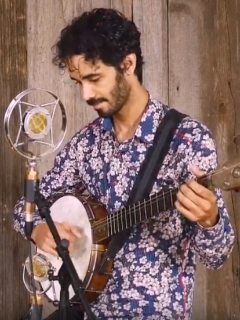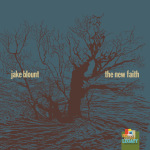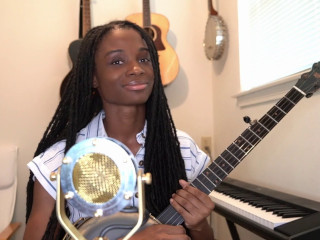

'The New Faith' tells an Afrofuturist story set in a far-future world devastated by climate change. Jake Blount and his collaborators embody a group of Black climate refugees as they perform a religious service, invoking spirituals that are age-old even now, familiar in their content but extraordinary in their presentation. These songs, which have seen Black Americans through countless struggles, bind this future community together and their shared past; beauty and power held in song through centuries of devastation, heartbreak, and loss.
Jake Blount is the LGBTQAI+ activist who's new album features re-imagined traditional Black spirituals - envisioning what Black refugee music would sound like in a not-so-far world devastated by climate change.
Acclaimed musician and scholar Jake Blount will release his highly-anticipated new album, The New Faith, 23 September on Smithsonian Folkways Recordings. The follow up to 2020’s breakthrough debut, Spider Tales, which The Guardian awarded a perfect five stars and called, “an instant classic,” The New Faith will be released as part of Folkways’ African American Legacy series—co-conceived with and supported by the Smithsonian National Museum of African American History and Culture.
A towering achievement of dystopian Afrofuturism, The New Faith is spiritual music, filled with hope for salvation and righteous anger in equal measure. The album manifests our worst fears on the shores of an island in Maine, where Blount enacts an imagined religious ceremony performed by Black refugees after the collapse of global civilization due to catastrophic climate change. Most importantly, it snaps us out of our tragically limited historical vantage point to better understand our actions and culture as they exist in deep time. If singing songs together as a community reminds us of who we are and where we come from, Blount harnesses that power to show us what may be remembered when our connection to our natural environment is severed – when our relationships with Death and each other are transformed into something more beautiful and more horrifying than anything we could have imagined.
Jake Blount’s music is rooted in care and confrontation. He is a scholar of Black American music, speaking ardently about the African roots of the banjo and the subtle yet profound ways African Americans have shaped and defined the amorphous categories of roots music and Americana. His 2020 album Spider Tales highlighted the Black and Indigenous histories of popular American folk tunes, as well as revived songs unjustly forgotten in the whitewashing of the canon. This record features ten reimagined and reinterpreted traditional Black spirituals across twelve tracks in addition to two original spoken word pieces.
"I have long felt a powerful draw to the old spirituals passed down in my community," writes Blount. "I am an unlikely devotee; I only rarely attended church as a child, declared myself an atheist at the tender age of eight and developed a strong antipathy toward Christianity when I began to understand my queerness. Nonetheless, spirituals are the songs I bring to communal singing events. They are the songs I teach. In moments of homesickness, sorrow and fear, they are the songs I turn to for solace."

"This record envisions Black American religious music in a future devastated by warfare and anthropogenic climate change. The record is based on field recordings of Black religious services from the early-to-mid 20th century, but it is composed entirely of new arrangements and subtle rewrites of traditional Black folk songs. To make an informed prediction, I referenced a more diverse cross-section of the African Diaspora’s music than I ever have before. This album incorporates sounds from Belize, Georgia, Jamaica, Texas, Mississippi, New York and beyond."
"It is not surprising to me that the most paralyzing time of my life, and the deepest dive into history I’ve yet taken, have resulted in an Afrofuturist album. I believe our most likely future bears a close resemblance to our past."
"The end result is an album comprised of songs and sounds heard in traditional African and African American ceremony, but updated with modern techniques. Drums, banjos, fiddles and song meet rock and roll, rap, looping, and contemporary arrangements. Ambient sounds and drone material collected on Cushing’s Island, Maine, establish the soundscape. I discerned the sound of the future by listening to the past and present."
"The destruction of a way of life entails both loss and growth. The traditional songs I adapted for The New Faith originally developed among a people who had but recently been robbed of home, history, family, culture, and society. The unique history of African American people made our musical tradition an ideal candidate for my ambitious task. The New Faith is a statement of reverence for our devastating, yet empowering past; of anticipation and anxiety toward our uncertain future; and of hope that, come what may, something of us will yet survive.”

Produced by Blount along with Brian Slattery, the album was recorded mainly in Blount’s own bedroom in Providence, RI. In addition to Blount on vocals, fiddle, banjo, bass, percussion and strings and Slattery on percussion, guitar and strings, the album features guest appearances by Demeanor, D’orjay The Singing Shaman, Samuel James, Kaïa Kater, Lizzie No, Mali Obomsawin, Brandi Pace, Rissi Palmer and Lillian Werbin.
In celebration of the album, Blount will embark on an extensive headline tour this fall including stops at Chicago’s The Hideout, Minneapolis’ First Avenue, Philadelphia’s World Café Live, Washington, DC’s Pearl Street Warehouse, Brooklyn’s Jalopy Theater and Boston’s Club Passim as well as appearances at Bristol Rhythm & Roots Festival, AmericanaFest and Bourbon and Bluegrass Festival.
Based in Providence, RI, 26-year-old Blount is an award-winning banjoist, fiddler, singer and scholar specializing in the folk traditions of Black and indigenous Americans. In 2020, his debut solo album, Spider Tales, launched at #2 on the Billboard Bluegrass chart and received overwhelming critical praise landing on year-end best of lists at the The New Yorker, NPR Music and more. In addition to his solo work, he is half of the internationally touring duo Tui, a recipient of 2020 the Steve Martin Banjo Prize, a two-time winner of the Appalachian String Band Music Festival (better known as Clifftop) and a founding member of Bluegrass Pride. Blount has performed at the Kennedy Center, the Newport Folk Festival and numerous other venues across and beyond the U.S. He has presented his scholarly work at museums and universities including the Smithsonian Institution, Berklee College of Music and Yale University. His writing has appeared in Paste Magazine, No Depression, and NPR Music.
Smithsonian Folkways Recordings is the nonprofit record label of the Smithsonian Institution, the national museum of the United States. The label's mission is to document music, spoken word, instruction and sounds from around the world, continuing the legacy of Moses Asch, who founded Folkways Records in 1948. The Smithsonian acquired Folkways from the Asch estate in 1987 and Smithsonian Folkways Recordings has continued the Folkways tradition by supporting the work of traditional artists and expressing a commitment to cultural diversity, education and increased understanding among peoples through the production, documentation, preservation and dissemination of sound.








“I learned "Once There Was No Sun" from a Bessie Jones recording. The track opens with a reading from Genesis, describing the world in the days prior to the creation of light, the sun, and the moon. The song’s lyrics reflect on the same period of time, reminding us that many things we treat as universal constants did not always exist - and, by extension, could recede into nothingness at any time. "Once There Was No Sun" is an invitation to reflect on the impermanence, fragility and beauty of a world we too often take for granted.
We filmed on a small island off the coast of Maine, which also inspired the setting for 'The New Faith,' and it was clear to us from the start that the video should highlight the majesty of the landscape. The video is a celebration of beauty, in some of its most elemental forms: wind, light, sea and stone, and human bodies moving through it all. It’s my hope that, through such celebrations, we can learn to better care for all these things.”
Photo Credits:
(1)-(3) Jake Blount,
(4) Kaïa Kater,
(5) Brandi Pace,
(6) Samuel James,
(7) D’orjay The Singing Shaman,
(8) Lizzie No,
(9) Rissi Palmer,
(10) Mali Obomsawin
(11) Lillian Werbin (unknown/website).